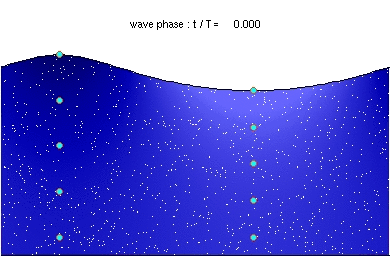Since I am now home (Jim's still in Morro Bay ), I put on my Wikipedia shirt, hit the research button, and collected some data on waves:
Wind waves (or ocean surface waves) are waves occurring on the surface of oceans, lakes, rivers, etc. They result from the wind blowing over a vast stretch of fluid surface. Wind waves can range in size from small ripples to huge waves over 30 m high.
When directly generated and affected by local winds, a wind wave system is called a wind sea. After the wind ceases to blow, the remaining wind waves are called swells. Swells are not affected by local winds, because they have been generated elsewhere or some time ago. Multiple swells and local waves, surf or chop can combine to give larger total waves:
A fully developed sea has the maximum wave size theoretically possible for a wind of a specific strength, duration, and fetch. Further exposure to wind just causes the wave tops to break, creating "whitecaps".
Wind waves have randomness: waves differ in height, duration, and shape with limited predictability.
For weather reporting, wave height over a period of time is expressed as significant wave height. This figure represents the average height of the highest one-third of the waves in a given time period (usually 20 minutes to twelve hours). Significant wave height is the size a "trained observer" would estimate from visual observation. The largest individual waves are about twice the reported wave height for a particular day.
The phases of an ocean surface wave include:
1. The Wave Crest, where the surface layer of water is going in the same direction as the wave.
2. The Falling Wave
3. The Trough, where the surface layer of water is moving opposite to the wave.
4. The Rising Wave
As a result of all these forces, we and JASON were all scrambled up!
We believe JASON can contend with rougher seas than we have hitherto experienced. But its equipment and furnishings (chairs, TVs, dishes) and operators cannot. We are staying on the land side of this big rock until all these huge waves dissipate.





No comments:
Post a Comment